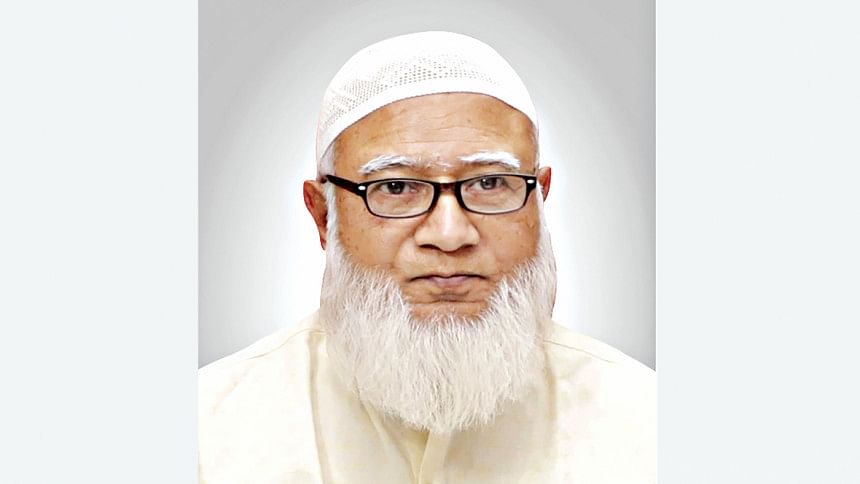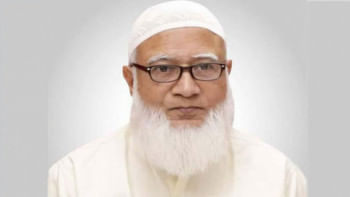‘Jamaat to end cycle of revenge’

Jamaat-e-Islami is one of the oldest parties of the subcontinent. Its roots can be traced back to colonial India. Founded in Lahore in 1941 to promote social and political Islam, this party opposed Bangladesh and its Liberation War. According to media reports during the 1971 war and historical records, it aided and abetted the Pakistan army in committing acts of genocide in Bangladesh. The leaders of Jamaat and its student wing Chhatra Sangha had led and encouraged the formation of vigilante militias like the Razakar, Al Badr and Al Shams. Lately, the Islamist party has become a major player in the shifting political landscape following the mass uprising and fall of the Awami League government on August 5. In light of the prevailing context and a drastic realignment of the political forces, it has become important to know and understand the stance and vision of the key Islamist parties. This interview of Jamaat chief Shafiqur Rahman, done on October 10, is the first in a series of interviews with leaders of Islamist parties.
Bangladesh's vicious cycle of political retribution stops with Jamaat-e-Islami, said its Ameer Shafiqur Rahman.
Pointing out that the previous regime had been particularly vicious towards his party, the Jamaat chief, during an exclusive interview on October 10, said if anyone had the right to vengeance, it was Jamaat.
But assuring that his party would not seek revenge, Shafiqur said, "We want to operate as a responsible organisation contributing to the stability of the country."
This was why, he explained, the party leadership had asked its rank and file to refrain from criminal activities. "We have to be patient during these trying times when the nation is sort of going through birth pangs."
A political activist since his teens, Shafiqur noted that as there had been some instances of anarchy soon after the fall of the previous regime, he strongly urged Jamaat activists not to take the law into their own hands.
Speaking to The Daily Star, the Jamaat chief said the party had a "common principle" for all those who had wronged them: "The politics of revenge and retribution must be put to the grave".
A physician by training, he said it did not matter if no one else was on board. "Someone has to bell the cat. So why not me?"
Noting that the minorities had come under attack in the wake of Awami League's fall, the Jamaat chief said his party activists were among those who had then taken up vigil at temples and pagodas. "But that should not be the case ... if mosques did not need security, why should temples and pagodas?"
He added, "Religion and party, to each his own. But the state belongs to everyone. Everyone must converge on this basic point of agreement if people desire a healthy society and a strong state."
Regarding the allegations against Jamaat-e-Islami and its leadership during the Liberation War, Shafiqur said he would have no reservations about apologising for the misdeeds if they were proven beyond doubt.
The Jamaat chief also clarified that crimes of individuals did not constitute culpability of Jamaat as an organisation automatically.
He explained that he heard afterwards that the Jamaat leaders in 1971 feared that an independence, which had been won "with the favour, cooperation and active engagement of India" would not bear rich dividends that the people expected. He said the leaders feared that "there would be an undue influence over Bangladesh, and because of that, we would not be able to emerge and establish ourselves as a truly sovereign nation with full dignity".
About the shifting political landscape and whether he had reasons to be apprehensive, the Jamaat ameer explained how the country had never really been completely stable since its birth in 1971. Regarding the fluid political state at present, he said, "You can never really wish away your apprehensions."
Shafiqur referred to two events that many thought aimed to destabilise the government. "There was a chance of a judicial coup soon after the changeover. Then there was an incident with the Ansar." He said there were "strange incidents of provocation" at different levels.
He said some members of the government were making political statements at times and cautioned that the partisan statements from advisers did not bode well for the country. "This government is a non-partisan government. It is best that we don't hear anything partisan from a non-partisan government."
Queried about women's participation within Jamaat's policymaking body, the majlis-e-shura, and its central working committee, Shafiqur said while women constituted about 40–42 percent of its full members (rukn), women accounted for about 35 percent in both the shura and the central working committee. "And it is gradually rising."
About women leading the country for over more than three decades, the Jamaat chief said, whether it was Sheikh Hasina, Khaleda Zia or Rawshan Ershad, they all had inherited legacies of their husbands or fathers. "None of them climbed up the ranks from the grassroots as an individual political worker."
Asked when Jamaat might have its first woman ameer, the party chief declined to answer saying, "I will hold my answer for now."
While the Jamaat chief endorsed the Islamic rules of inheritance, saying that those rules favoured women more than men, he refrained from saying whether his party would oppose the Women's Development Policy of 2011 — calling for equal inheritance between men and women — that was withdrawn in the face of strong protests.
He said, "We are not opposing anyone. We are merely advocating a certain position in the light of Islam."
As for the legal system, he said while the Islamic laws would have equal weight for testimony of Muslims and non-Muslims, it would not have the same weight for men and women. The Jamaat chief explained that the provisions called for two women in the stead of a man. "Allah has explained that it is because one woman can assist the other if one becomes unable to testify."
When asked about his views on songs and dances that are an integral part of the Bangali culture, the Jamaat chief remarked that when the Prophet Muhammad (pbuh) migrated from Mecca to Medina, young boys and girls had greeted him with songs and dances. "He did not mind that."
The Pahela Baishakh celebrations have seen opposition from Islamist groups. About Jamaat's views on celebrations like Pahela Baishakh with its mangal shobhajatra and Ekushey February (February 21, International Language Day) with its probhat feri, and whether Jamaat would join in celebrating these festivals, Shafiqur said there was some merit to the reservations expressed by religious scholars about mangal shobhajatra.
He went on to say that celebrations, no matter what they were, should be in an orderly fashion. "But that does not happen, which is the main point of concern."
He said good will not come from just a shobhajatra. "For that we have to change our characters. If the character and actions are well-intentioned, only then will good come from it."
Jamaat has recently put forth a number of reform proposals, and one of them endorsed sculptures based on the nature of Bangladesh rather than figures of living beings like animals or humans.
Asked about Jamaat's position regarding sculptures like Aparajeyo Bangla or Raju Bhashkorjo, both of which depicted humans, Shafiqur said, "We are indifferent."
Asked if Jamaat would call for these sculptures to be razed or whether it would want to put a stop to building any more of such sculptures, he explained that extreme actions were almost always a result of outburst. "It is because our society is intolerant. We must increase our tolerance."
He said whatever had to be done would have to be on the basis of consultations and discussions.
When pointed out that Shafiqur used words like mazlum, khalaas, and majlis-e-shura and asked about the reason behind Islamist politicians' preference for Urdu, Farsi or even Arabic words over Bangla, Shafiqur said, "This language is a rather generous one."
Bangla has become enriched with words from so many other languages. It has words from Sanskrit, Arabic, Urdu and even English, he said.
"Take Awami League for instance. Awam is Urdu and League is English. There is no Bangla at all. Our name is fully Arabic. Take BNP…it's all English.
"The people will accept whatever words they understand easily. You might say this the beauty and generosity of the Bangla language," said Shafiqur getting ready for his afternoon prayers.
Shafiqur Rahman bio
Shafiqur Rahman's political activism began with a street march in his village during the 1969 mass upsurge. He was still in his teens when he was picked to write posters leading up to the 1970 general election. Like millions, Shafiqur too rooted for the "boat", Awami League's electoral symbol.
In later years, he got involved with the student wing of Jatiyatabadi Samajtantrik Dal, commonly called Jasad Chhatra League.
He was soon disillusioned with Jasad and decided to move away from its influence.
Shafiqur was first introduced to the Jamaat-e-Islami's student wing Chhatra Shibir when he had just started at the Sylhet Medical College, which he says was a turning point in his life.


 For all latest news, follow The Daily Star's Google News channel.
For all latest news, follow The Daily Star's Google News channel. 





Comments